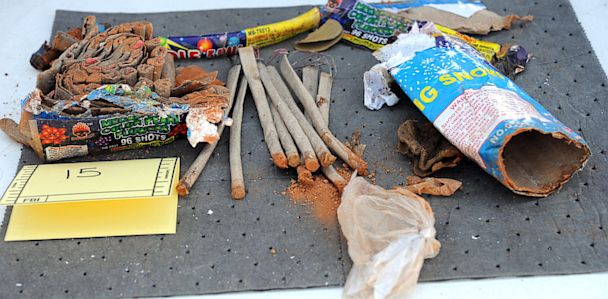Feds Worry About July 4 Fireworks Bombs

Department Of Justice/FBI
When police officers around the country meet for their morning musters over the next week, many of them will likely be reminded by supervisors that fireworks - so popular around the Fourth of July - can be used to build bombs.
"Recent incidents in the Homeland demonstrate that consumer fireworks - widely used during the upcoming [July 4] celebrations - can be misused by criminals and violent extremists to construct improvised explosive devices," the FBI and Department of Homeland Security said Friday in a notice to federal, state and local law enforcement agencies nationwide.
Such notices have become somewhat routine, acting as an "FYI" to the larger law enforcement community and rarely drawing on any fresh intelligence. Still, there is an added sense of caution around this Fourth of July because of how the Boston Marathon bombs were constructed.
Explosive powder from fireworks was used to construct the bombs used in that attack, according to federal authorities. And shells of fireworks were later recovered in a backpack belonging to one of the suspects, the notice issued Friday said.
SEE ABC'S FULL COVERAGE OF THE BOSTON MARATHON BOMBINGS
According to FBI officials, homegrown terrorists and other extremists acting on their own "are of paramount concern" this Fourth of July as masses of revelers are expected to pack city centers and other locations. The officials worried such "crowd density" could be an "opportunity to perpetuate a mass casualty attack," as illustrated by the Boston bombings.
In fact, the suspects in that attack originally planned to strike Fourth of July festivities in Boston, which hosts one of the biggest and most acclaimed celebrations each year, sources have said. But the bombers allegedly changed their minds and launched their attack months earlier when the homemade bombs were ready.
For the first time this year, the FBI's New York Field Office is sending at least two bomb-technicians to Boston to help their colleagues there over the holiday. It's unclear if other field offices are following suit.
One law enforcement official said the assistance is simply "out of an abundance of caution" to boost manpower in a city recently rocked by a terrorist attack. As of Friday night, authorities had come across no specific, credible threats related to this holiday, one U.S. official said.
Still, the official said, authorities can't help but be "concerned about other knuckleheads" like those responsible for the Boston bombings.
Friday's "Roll Call Release," as such notices from the FBI and DHS are titled, offered law enforcement agencies and private security personnel tips to identify potentially suspicious behavior, including paying close attention to anyone asking questions "that go beyond mere curiosity about the potential damage fireworks could cause."
The notice, obtained by ABC News, comes one day after federal authorities released a 30-count indictment against the surviving Boston bombing suspect, 19-year-old Dzhokhar Tsarnaev. He allegedly learned how to build bombs from Volume One of "Inspire," the online magazine produced by al Qaeda in the Arabian Peninsula.
The magazine, first published in summer 2010, included detailed instructions for building homemade bombs using pressure cookers, shrapnel and explosive powder from fireworks, according to indictment.
Two months before the Boston bombing, the older suspect, Tamerlan Tsarnaev, drove to Phantom Fireworks in Seabrook, N.H., where he bought 48 mortars containing about eight pounds of low explosive powder, the indictment alleged. After the attack on April 15, authorities found fireworks emptied of their explosive powder in the younger suspect's college dormitory room, according to the indictment.
The pair is allegedly responsible for one of the worst terrorist attacks on U.S. soil since 9/11, killing three, including an 8-year-old boy, and injuring more than 260.
But even before "Inspire" magazine offered detailed bomb-making instructions to anyone with Internet access, homegrown terrorists tried to use fireworks in their plots against the U.S. homeland. In May 2010, Faisal Shahzad, trained by the Pakistani Taliban, used more than 150 small fireworks in his failed attempt to blow up a Nissan Pathfinder in New York City's Times Square.
The notice issued Friday cited Shahzad's case and mentioned last year's theater shooting in Colorado, where authorities found consumer fireworks components in the main suspect's apartment.
Fireworks are available for purchase in most U.S. states, but they are banned in Delaware, Massachusetts, New Jersey, and New York, the notice said.